
Shonen Knife is a Japanese pop-punk band formed in Osaka in 1981. Influenced by 1960s girl groups, pop bands, the Beach Boys, and early punk rock bands such as the Ramones, the band crafts stripped-down songs with simple yet unconventional lyrics sung both in Japanese and English.

Genki Shock! is a 2006 album by the female Japanese rock trio Shonen Knife. The cover design was created by singer/guitarist Naoko Yamano's toddler daughter, Emma.

Heavy Songs is a 2002 album by the Japanese rock group Shonen Knife.

Happy Hour is a 1998 album by the Japanese rock trio, Shonen Knife. The cover artwork is by Yoshitomo Nara. It is the last album by the group with their original bass guitarist, Michie Nakatani.

Brand New Knife is a 1997 album by the Japanese rock trio Shonen Knife. The Japanese version of this album contains six tracks with English lyrics and seven versions of the tracks with Japanese lyrics. The U.S. version features all 13 tracks in English, with the Japanese versions of the seven tracks featured as bonus tracks. In 2020, Jonathan McNamara of The Japan Times listed it as one of the 10 Japanese albums worthy of inclusion on Rolling Stone's 2020 list of the 500 greatest albums of all time.

Rock Animals is a studio album by Shonen Knife. It was released on September 8, 1993, in Japan. It peaked at number 59 on the Oricon Albums Chart, as well as number 39 on Billboard's Heatseekers Albums chart.

Let's Knife is a studio album by Shonen Knife. It was originally released on August 26, 1992, in Japan. The album features re-recorded versions of earlier Shonen Knife songs, with new English lyrics. It peaked at number 64 on the Oricon Albums Chart. In 2007, Rolling Stone Japan placed it at number 37 on its list of the "100 Greatest Japanese Rock Albums of All Time".
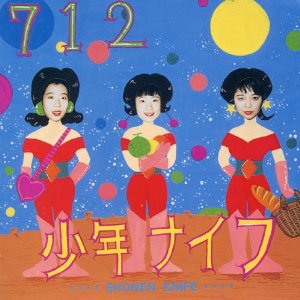
712 is a 1991 album by the Japanese rock trio Shonen Knife. Using goroawase, "712" can be read as "na-i-fu", the Japanese imported word for "knife".

Pretty Little Baka Guy is a 1986 album by the female Japanese rock trio Shonen Knife. It was re-released in the US as side one of a record/tape, with side two being Live In Japan. There have been many releases of this album in various countries over the years, with each release containing different rare tracks.

Strawberry Sound is an album by the female Japanese rock group Shonen Knife, released in 2000. It was their first album without founding member Michie Nakatani. It was released only in Japan.

Tokyo Encore was the final release by Gumball. After leaving Columbia Records at the end of 1994, the band released a live album compiled from the band's 1993 tour of Japan and sold through their fan club on their own T.E.C. Tones label. Gumball were joined on stage by members of Shonen Knife during the performance. The album features live covers of songs by The Beatles, Deep Purple, and the Germs.

Fun! Fun! Fun! is a pop-punk album by Japanese pop punk band Shonen Knife, released on July 6, 2007 on Blues Interactions Japan. The album marked the 25th anniversary of the band.

Minna Tanoshiku or Everybody Happy is the first release by the Japanese rock band Shonen Knife. It was released in cassette-format only in 1982 in the band's native Japan. The first 50 copies were released by the band themselves, and the insert features the lip prints of the three band members, although Michie Nakatani once said that the lip print was by her grandmother. An additional 20 copies, without the lip inserts, were pressed by Zero Records before the band requested that further pressings be ceased.
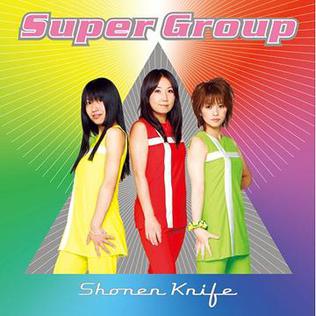
Super Group is an album by the Japanese rock trio Shonen Knife. It was released in Japan on 7 November 2008, in the USA on 20 May 2009, and in the UK and Europe in 2010. The original Japanese CD issue was released as a mini-LP cartoon package with a gatefold and poster inside.

Free Time is an album by the Japanese rock trio Shonen Knife. It was released in Japan on January 6, 2010. An English version was released in the United States on November 9, 2010, by Good Charamel Records. It was released in Europe on July 11, 2011, with different cover art.
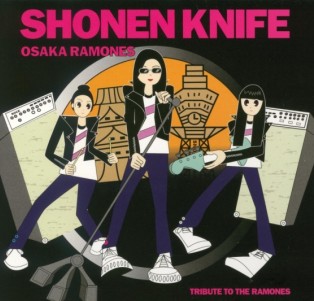
Osaka Ramones is Japanese pop-punk group Shonen Knife's 16th studio album. All of the songs on the album are cover songs of the punk group Ramones. The album's cover art takes its inspiration from the Ramones album Road to Ruin. Five songs on the album were recorded in at GCR Audio in Buffalo, New York with Producer Robby Takac in late 2010 and it was intended to be a mini-album. Lead singer/guitarist/songwriter Naoko Yamano later decided that Osaka Ramones would be a full-length album celebrating Shonen Knife's 30th anniversary. The rest of the album was later recorded in Osaka, Japan and mixed at GCR Audio.
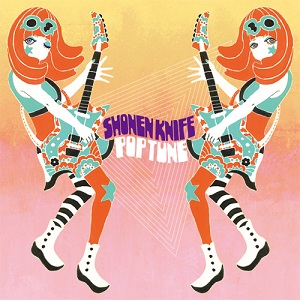
Pop Tune is the 18th studio album by pop-punk trio Shonen Knife. It was released in Japan on June 6, 2012, and in early June in the U.S., U.K., and Europe. Along with lead guitar and main vocalist Naoko, the group's bassist, Ritsuko, provides the lead vocals for the song "Sunshine" and drummer Emi is the lead vocalist for the song "Psychedelic Life". "Osaka Rock City" was used as the theme song for the 2013 Japanese film Soul Flower Train.
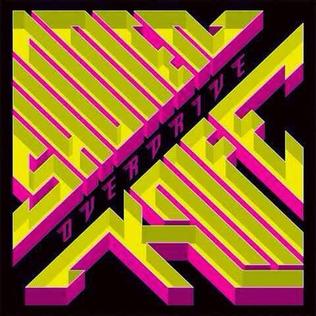
Overdrive is the 19th studio album by Japanese pop punk trio Shonen Knife. It was released on April 14, 2014 in Europe, and on April 16, 2014 in Japan. According to band leader Naoko Yamano, because their album Free Time (2010) was heavily influenced by punk rock, and Pop Tune (2012) had explored a more pop-oriented sound, Overdrive was a chance for the band to explore a more hard rock sound. The album's lyrics cover a wide array of topics, from green tea, fortune cookies, and cats.
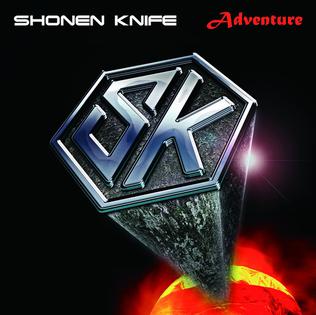
Adventure is the 20th studio album by pop-punk band Shonen Knife. It was released in 2016. According to Bob Lange of Glide Magazine, Adventure is Shonen Knife's most rock-oriented album. According to Anna Rose, the lyrics of the songs in the album are upbeat. To promote the album, the band went on its "2017 USA Ramen Adventure Tour".
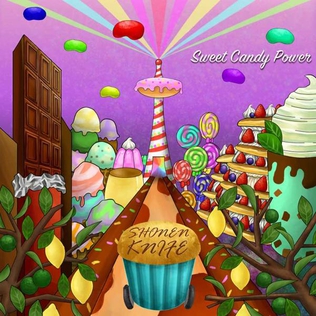
Sweet Candy Power is a studio album by the Japanese pop-punk band Shonen Knife, released in June 2019. It features guest appearances by former band members Ritsuko Taneda and Naru Ishizuka.




















